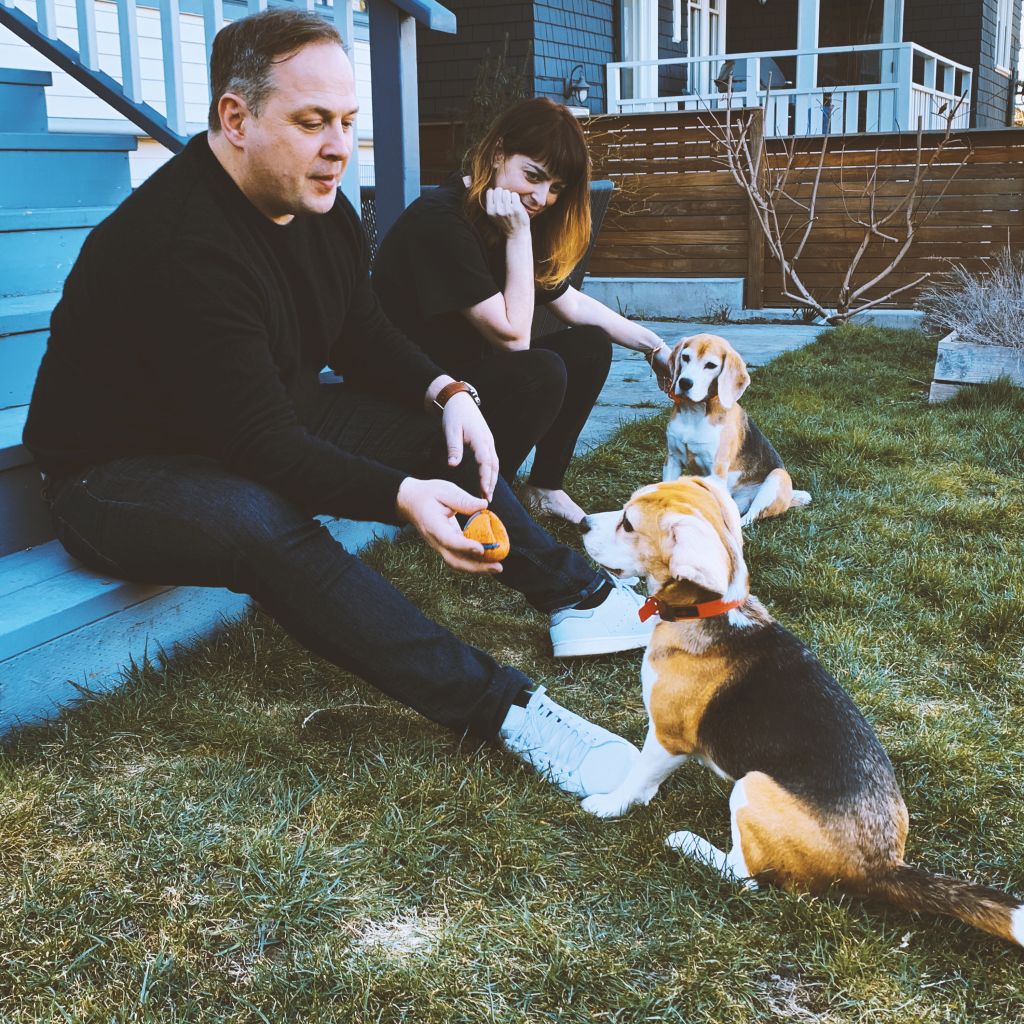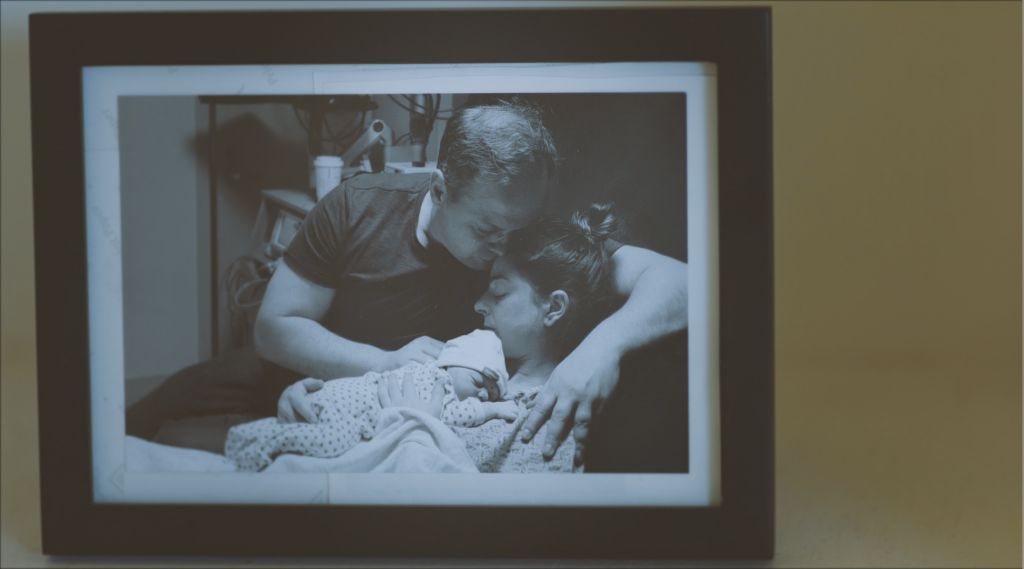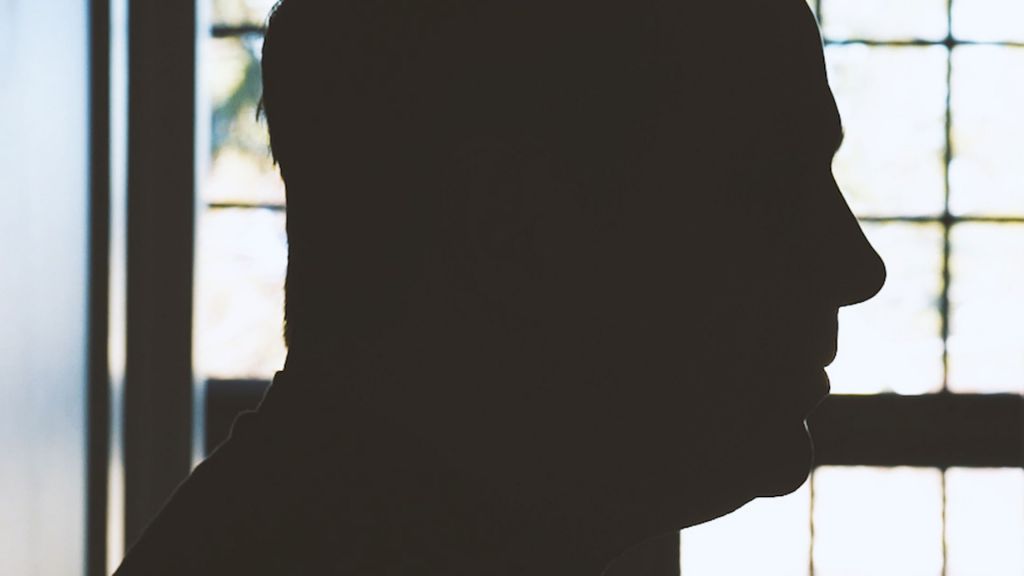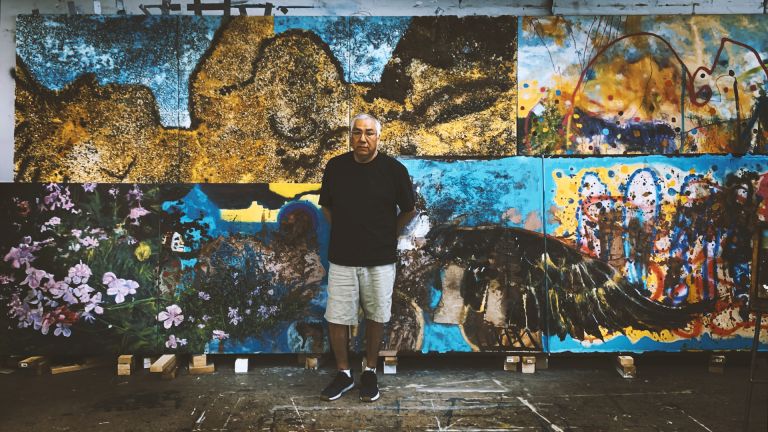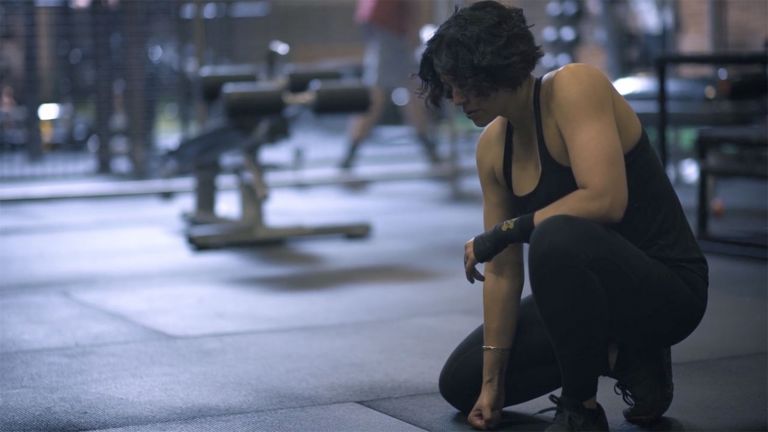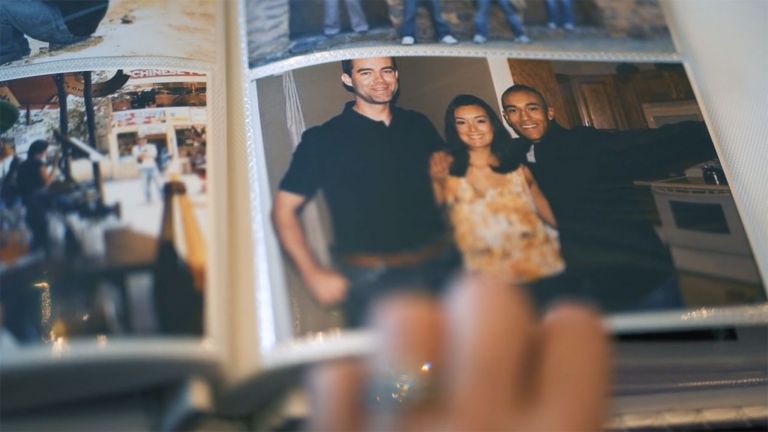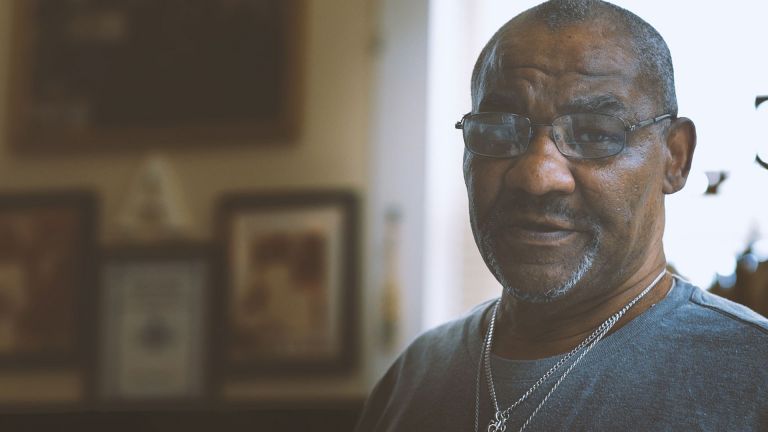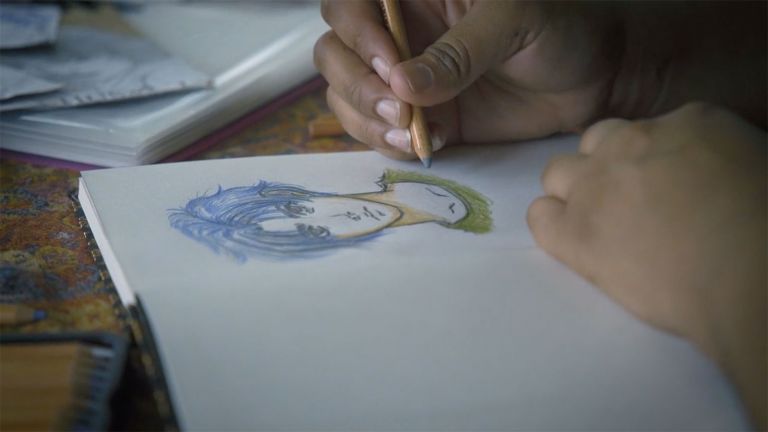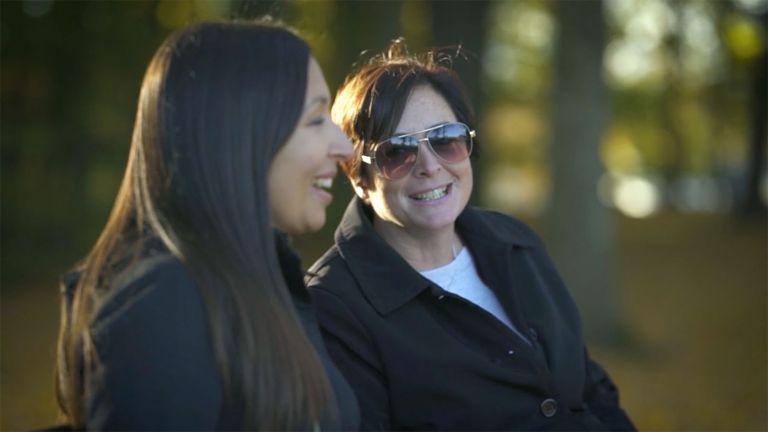Hepton Family
Jenn and Nic Hepton struggled with infertility for 10 years. In 2013, Jenn was pregnant with twins and had to terminate for medical reasons (TFM); she went on to suffer multiple miscarriages. In 2017, Jenn and Nic’s daughter, Loey, was stillborn. They describe the impact compassionate care can have on grief; the experience of losing their twins was completely different than that of their daughter, largely because of how their loss was acknowledged by Jenn’s healthcare providers.
JENN: My babies.
NIC: My daughter. My twin sons.
JENN: I’ve had many different experiences in my grief journey. It started when we lost our twins. And that was termination for medical reasons. And that was a really difficult pregnancy. So the grief actually started really early. The whole thing was so traumatic because every time we went for an ultrasound it was bad news. Then they said we had to terminate one, so then we were grieving that one. And then sadly we had to terminate both.
NIC: We’d started grieving had throughout the course of the pregnancy, but the reality of you experiencing that loss hits you in the face when you’re in the hospital, and you’re- you’re making some really, really tough decisions around the- the future of- of health of your wife, your partner, and of your unborn babies. We were very, very unknowledgeable about grief. We had no idea what was about to come and hit us, and so we wanted to move on. And thought we could move on in a linear way as quickly as possible, and just found out it wasn’t that way.
JENN: Then after the loss of our twins we had several miscarriages. And then we were pregnant with IVF with our daughter in 2016 and we lost her at 39 weeks and five days. When we had to terminate our twins for medical reasons, the care around that was very highly medical. But there was no talk about the grief. There was no care around that.
NIC: And I think in a way, we thought the grief would be easier if we didn’t prolong it. And we thought that if we could make it as surgical as possible, it would be easier for us to- to move on from it. And that’s- that’s not the case at all. Like at all.
JENN: it wasn’t ’til we lost our daughter Lowy that I realized that I had PTSD for five years. You know, I’d go into trauma loops. Or I would go into a ball in a corner and start crying and shaking, because I was unaware that I was holding trauma. When we lost Lowy, the support was different. The hospital was amazing. And they gave us time to grieve, gave us time to hold her. Social worker came in about three times a day. So she gave us this space to grieve, but she also made sure to let us know that she was still there if we needed her.
NIC: It’s the hardest thing in the world to stay in a hospital room for two days with your dead child. And … but it’s the only thing that enables you to walk forward. I wish we’d known just how important it would be for us to build some kind of special bond with our children, no matter how small. Even if it was an image, because that’s the only thing you get to take forward.
NIC: Grief shows up not in the way you expect it to. Um, it’s messy. When you hear about grief, you hear about there are stages to grief. And you move from stage to stage, and that’s just not true at all. Um, you might move from stage to stage, but then you … It’s not linear. You- you never … You’re never recovered.
JENN: I struggled with grief or trauma for five years not knowing it. Affecting my career, ’cause I was a schoolteacher. Didn’t want to go back teaching children. I was triggered constantly. Affected my marriage with my husband ’cause I wasn’t communicating. Affected my health. And it wasn’t ’til the awareness was there, and the permission to grieve that I was like ... like I literally took a deep breath. I went ... (deep breath) right, no duh that you’re going through all this. It’s because you’re grieving. You’re grieving your pregnancy, you’re grieving the loss of your twins. But you’re also grieving the way that you were treated. And that ongoing trauma that was there in so many different ways.
JENN: How people support you in your grief makes a huge difference. I don’t think people understand that this is ... forever. It’s not something that you get over. Fast forward 10, 20 years, I’m still going to be in my grief. I may walk into a grocery store and see a girl that looks like Lowy or will remind me of Lowy, and I might start crying, 20 years later.
JENN: Grief is painful. Grief is suffering. And it is uncomfortable. And as a society, we have been taught that pain is not good. We don’t want to feel pain. You need to feel pain to understand what joy is.
I don’t know why this is, but the loss of a pregnancy, I still feel is the greatest taboo topic that people don’t speak about. Um, and you only get to know about how commonplace, like, the experience of miscarriage or, or pregnancy loss is. It’s when you speak about it. Because then everyone else speaks about it. But, if you were l- s- to lose a parent, say for example, like, I, I, I lost my mom a week before we lost Loey. Completely unexpectedly. And, and, people would speak to me about that, and speak to me more readily about losing my mom versus losing, um, losing Loey. And so, and so, I think it’s one of the greatest tragedies that, that pregnancy loss, it is all to common, at whatever stage it occurs, and yet it is unspoken in many ways, and people are e- expected to ... people are I, I’m given the empathy, all the support, um, all the time, the grace, you know, you name it. They’re not giving anything to think about how they move on from losing a pregnancy. At whatever stage it happens. Um, and, and I think that’s a real shame. I really do.
My grief after losing our twins showed up in anxiety. And so I was scared to drive over a bridge. I was scared to go to public places. I was scared to ... I was just anxious about everything. And again, I didn’t realize that was my grief showing up for me. So went to see just a generic counselor. Sat down, was talking about the anxiety. She actually, you know what, she re-traumatized me, because she was talking about the anxiety as being like a mental illness. And um, you know you need to be on drugs, which is fine. Um, but there was no correlation between the anxiety and what happened with grieving. Um, and so that re-traumatized me to be honest. And I went three sessions, and I was like, I don’t want to do this anymore. And so I was left alone. Um ... and that was, that’s heartbreaking. I was- that was really heartbreaking.
We don’t have those tangible memories. You don’t have the first birthdays, the second birthdays. We don’t have the weddings. We don’t have those memories that we would have when our mother passes away, our grandmother passes away. Um, so people don’t have memories to hold onto. Um, and so they’re not tangible memories, but for us as parents, it’s the memories that could have possibly happened, you know? Like, if you go on a trip, oh, Loey would totally love this! Oh my God, she’d be playing in the sand in the beach. That’s the memories that we’ve lost. And so, I think people react to it differently because of that, because they don’t have those tangible memories.
I think we found early on I think it was maybe 11 weeks that one of our twins wasn’t going to be viable. Um, that we were already traumatic- uh, going through trauma and grieving without knowing we were grieving. That we disassociated ourselves from our twins.
And again, one of the biggest regrets but you only- you only know what you know and you only do what you can do. But we disassociated from them. So we don’t- we didn’t give them names at that time. And we don’t even know if they were a boy- they were boys or girls. Like we were like, “No we don’t want that information.”
And nobody said to us, it may be a good idea just to know their name. Like we- we know what sex they were. Even to the day that we lost- that we had to do the termination. No one told us the gender of our- of our babies. And yes we had said we don’t want to know, but again someone has to stand up for you in that moment. ’Cause you’re in grief, and you’re disassociating yourself from things. And you’re trying to survive.
Um, so we still to this day have no idea if they were boys or girls. Intuitively, through my healing, we believe they were boys and we named them now. Um, but with Loey we knew her name right away, we shared her name with everybody. I mean Loey was our rainbow baby and, rainbow babies are babies that are born after pregnancy loss. So we were- we just treated that as if it was going to happen. Like, life can’t be that cruel right? Like it can’t be that cruel. Um, and so we named her and we told everybody about her name. And then when lost her, everyone knew it was Loey. Everyone knew, you know, it was our little girl. Um ... because we had that connection. We had the name.
NIC: The first time we lost the twins, like our first pregnancy, um, I don’t think we realized the dynamic had changed until years later. I really don’t. I- genuinely, she was probably grieving a lot, a lot longer than I realized for
JENN: We’ve had to learn how each other grieves, and we come to this relationship in, from different upbringings. We’re very different, but we complement each other in that way, and we just understand, and we have that really deep, deep love for each other. Um, you know, Nick’s been through trauma seeing me go through what I went through and losing his daughter, and I’ve had the trauma of going through what I was going through and losing our daughter, but we’ve still experienced trauma together. And so there’s a lot of respect there.
NIC: I think fundamentally it’s made us respect each other more, like I have so much respect and pride for the work she’s doing and for the things, the community she’s been out to build.
I think when I talk about it- if I tend to speak about grief in the past tense, it’s because I can now probably go for day, a day, days maybe without thinking about Loey. Um, but it’s, it’s, there’s always something that will remind me. It’s not always the same thing. Um, and then, and then I think about what would have been. I think about what could have been, what would it be like now? Um, so I don’t think so.
I think it gets happier with time maybe, you know, it always gets easier with time. But, but I think sometimes it gets a little bit happier with time. I can be happier for the moments that we had with her, you know when I reflect back on what I said about take time to build those memories because they’re the things that you hold in the future. I didn’t- I thought I knew it at the time, but I know it now that those are happy memories.
At some point in my previous journey with grief, at some point- other point in time through the grief, those had been sad memories. Um, but I can still, honestly I can still remember how she smelled. Um, and so those, those things are happy to me now. So I don’t think the grief ends, but the sadness does a little bit.
Sometimes it can feel like just time is standing still when you’re grieving, um, and everyone else’s life and everything else carries on, of course it does, but the, the overwhelming support that you can get is to know that, that, the grieving person is never moving as quickly as they tell you they are, as they’re acting they are, as they think they are. They’re never moving that quickly. They’re moving maybe at half that speed and so that, if you have an expectation of who they should be or what they should be, or how they should be acting or reacting, or where they should be in their grief journey, you should half that expectation.
If no one could explain it then I’d have nowhere else to go mentally in terms of, why didn’t we know, why didn’t we do something, why, why wasn’t this checked? Um, you know, if the medical staff say that 90% of it is unexplainable then, then I’m okay with that. I was okay with that, I still am.
Jen was different. Like, she searched for a long time. Um, she blamed herself for a long time. Um so for me it was much easier to think about the- I didn’t need to search for a reason why.
And so I think that that confused me in my grief because therefore I didn’t know why. I was okay with it on one hand that I didn't need to investigate further, on the other hand it just left me- it left me shattered that it happened.
Whereas I think Jen- Jen's grief showed up in a different way, you know, when, when we lost Loey she searched and searched. Within herself, outside of herself, she wanted all of the information and the information didn’t go anywhere. Um, but, but that was, that was what she needed to do. She wanted to know why. She had to know that there was a reason why and I was okay with that there was no reason why.
Grief is very traumatic in itself. And how we are supported in our grief really affects our healing journey. And so when we lost our twins, or when we had to terminate- terminate our twins for medical reasons, um, the care around that was ... there wasn’t any care to be honest. It was very highly medical. Um, which I’m thankful for because they were taking care of my health, and making sure that, you know, the health- my health was doing well. Um ... but there was no talk about the grief. No talk about mental health. Um, there was no care around that. when we made the decision that yes we were going to go ahead and terminate our twins, it was very much, this is what your body may feel like. Um, this is what the procedure’s going to be. But there was no talk about, well you’re grieving, you’re going to grieve a loss.
When someone has experienced pregnancy loss, miscarriage, stillbirth, it’s an out of order death. So, the body’s trying to make sense of it, because that’s not what we’ve been taught or learned. And I think what happens is, even the terminology, “miscarried,” you know, it just has a lot of shame and stigma around it.
And I think because we treat it as a medical situation, people see it as a medical situation.
So for instance, a friend of mine just had a miscarriage at seven weeks, and I was like, are you okay? Do you need any support? Oh, it was an early one. It’s fine. I’m good. I was like, ooh. Literature and research shows, and I know in a personal, um, way that ... you still need to grieve that loss, because it will come back in different ways, and, um, even if it’s buying a plant to remember, even if it’s just creating a moment that you go back to all the time, it needs to be seen as a death. It needs to be seen as a death in order for the body to really heal. Um, everyone grieves differently, but I definitely, um, know for a fact that people see miscarriages and stillbirths as different.
It’s the hardest thing in the world. I can honestly … It’s the hardest thing in the world to- to stay in a hospital room for two days with your dead child. And … but it’s the only thing that enables you to walk- walk forward. I regret that we didn’t have the- the foresight to- to get memories, and build … have a chance to build memories. We were never going to be able to stay with our children, but um, but not to be able to just have something to enable us to go forward with is- is incredibly difficult. Whereas the complete opposite with Loey. Like it’s- it’s incredibly hard. Like- like I understand why people … You know, if- if you went through child loss, especially at the very end or still birth, or it was completely unexpected. Every part of you doesn’t want … doesn’t want to be in that room. Like every part of you wants this not to be real. And for it to be a bad dream, but um, but there were moments in that room, and for the- the two days that we held Loey, where it was incredibly, um, peaceful and healing and, um. And our biggest fear at that point was h- how would we feel when they … when they eventually took her away. But, um, but actually that was … that was really peaceful too. And it was … it was kind of only later when like you start to think about grief.
But what- what would I wish we’d known? I wish we’d known just how important it would be for us to build some kind of special bond with our children, no matter how small. Even if it was an image, because that’s the only thing you get to take forward.
And after the process, and we had to go it through two, stopping the heartbeats and then I had to go in for an operation which is a DNE. There was again no talk about the grief. Actually there was talk about grief when I was just about to go in for surgery, the social worker walks in and says, “Would you like a lock of hair? Or would you like, um, a, um, a footprint? Or um, or yeah a footprint of your babies or anything like that.” But at this point, I was already like drugged up, I was in shock. Um, I couldn’t make the decision. And that conversation literally lasted five minutes. And my husband and I were like w-w- what was that? we were just like ... we just want this done. We just want this done. And not knowing that we were in shock. Like it was so traumatic that we were just in shock and not being able to make the decision.
I would have loved someone just to sit down in a calm way and say to us, “What you’re going through is really traumatic. You’re going to feel grief. You’re going to feel this. These are some suggestions, you know, see a grief therapist. Talk- find support. Create a ritual.” And if we came back and we knew that I was- it went, you know, the surgery went well, my health was okay. It would have been amazing to have a social worker to come in and just sit with us and say, “Just checking in, how are you doing?” You know ’cause again, we were zombies. We were in shock. We didn’t know what was going on.
There was no transition of- of healing. Um, so that is a huge, huge, huge, huge takeaway is, it would have been nice for someone to come in and just literally give us 15 minutes to hold space and go, this is what may happen.
But when we lost Loey, the support was different. The hospital was amazing. And they gave us time to grieve, gave us time to hold her. Social worker came in about three times a day. So she gave us this space to grieve, but she also made sure to let us know that she was still there if we needed her. And she was gentle, and she moved slowly. And she spoke about Loey, she noticed her. Um, she asked us how we were doing, even though she knew we were feeling like crap. Um, she made arrangements for funeral homes. She uh, contacted a grief therapist. Like, she was able to connect us with support. And because of that, the healing was completely different. Um, which is huge and so incredibly important.
